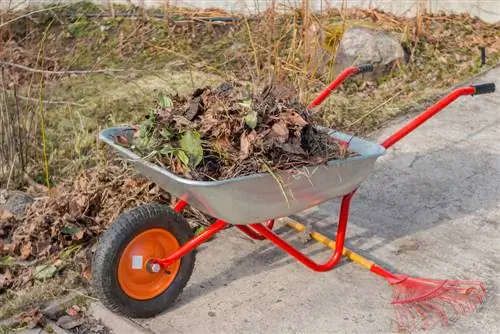- Author admin [email protected].
- Public 2023-12-16 16:46.
- Last modified 2025-01-23 11:22.
In autumn, when it is foggy, damp and cool, many people suffer from gloom. One of the most effective measures to prevent depression is gardening and the associated exercise in the fresh air.

Plants make you he althy and happy
This has been proven by a large number of scientific studies: those who work in the garden two to three times a week noticeably increase their inner satisfaction. The stress level drops to a similar extent as with the endurance sports often recommended by experts, and depressive moods and anxiety states that limit the quality of life decrease significantly.
Why do plants increase well-being?
- Staying in nature means lots of light, which puts you in a good mood and prevents depression or winter blues.
- Anyone who sows, grows and cares for plants themselves can experience countless, happy experiences of success.
- A common symptom of depressive disorders is recurring thought circles. Activities such as mowing the lawn, trimming hedges and planting flowers require full attention and interrupt rumination.
- Exercise while gardening is good for the mind and body. At the same time, work like weeding is meditative and can have a high relaxation factor.
- Plants are not demanding, which is particularly beneficial for people who have difficulty dealing with the complexity and unpredictability of interpersonal relationships.
- In addition, natural sounds such as birdsong, bees humming and the rustling of leaves in the wind have a calming effect. This can be demonstrated, for example, by the reduction in blood pressure.
Incidentally, it's not just passionate hobby gardeners who benefit from these positive aspects: even for those who really don't like gardening, spending time outdoors improves their mood, reduces stress levels and reduces negative feelings. It's no wonder that gardening has been used therapeutically since the 18th century. Working with plants is still an integral part of psychotherapy and occupational therapy, e.g. for people with dementia.
How do you get started with your gardening hobby?
If you don't have your own garden that you can help design, you may have the option of renting a field or allotment and starting gardening straight away. Nothing stands in the way of gardening success if you consider a few basic things:
- When planting, pay attention to the location, sunlight and soil. Each plant has different requirements that you have to take into account.
- Plants tolerate drought much better than constant wetness. Therefore, water carefully and only when the top centimeters of soil feel dry.
- Start with easy-care plants such as radishes, lettuce, spinach, nasturtiums or marigolds.
- Herbs such as lavender, rosemary and thyme are not only excellent food for insects, but their scent increases well-being.
- Don't let setbacks discourage you. Much of nature is beyond our control and you should just accept it without doubting your green thumb or your gardening skills.
The garden diary, another tool to relieve depression
Recording thoughts, feelings and events in writing is a meditative exercise that can also improve psychological well-being. Writing down everyday activities such as gardening and concentrating on positive things leads to a significantly more optimistic attitude.
The diary can fulfill various functions:
- It serves as a reminder for design ideas, planting plans and dates.
- It captures the most beautiful moments in the garden, supported by photos of plants that have developed particularly well.
- Optionally, it can serve as a notebook for gardening tips and thus become a valuable reference work.
You don't have to stick to fixed rules when writing your garden diary. A PC program is just as suitable as a diary app for your smartphone or a nicely bound diarium in which you can write your entries by hand.
Tip
There are numerous books that deal intensively with how people find themselves through gardening and do something good for their souls. We particularly liked “Where the Soul Blooms: Why a Garden Makes You Happy” by Doris Bewernitz and “You Can Plant Happiness” by Katrin Schumann. In this small volume, the author shares the importance that the garden and nature have for her life.






